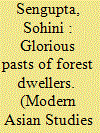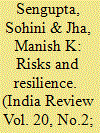|
|
|
Sort Order |
|
|
|
Items / Page
|
|
|
|
|
|
|
| Srl | Item |
| 1 |
ID:
187287


|
|
|
|
|
| Summary/Abstract |
This article discusses the shifts in rights over land of Binjhal Adivasi people in the wake of colonial rule in the ex-zamindari of Borasambar, located in the British Central Provinces in the eventful period from 1860–1926. Oral narratives and documents preserved by Binjhal villagers juxtaposed with archived records of military expeditions, village surveys, administrative letters, and land settlement reports reveal how Binjhal ancestors lost titled land and offices of headmanship, which, over time, impoverished and diminished them in the rural hierarchy. The research finds that the codification of selective custom as legal rights accommodated colonial land policies to promote social change and agricultural improvement. Environmental histories document how nineteenth-century forest enclosures and agrarian order brought Adivasi areas within state control. Revisionist research highlights historically contingent outcomes of colonial rule. The Adivasi pasts in this article reveal how the interpretations of legal culture by local actors, who transacted with the administration, led to variable outcomes for a pre-colonial land-controlling group. By examining the truth claims in fragments of Binjhal voices and narratives about them, in village memories and archives, through a threefold examination of the past—pragmatic, habitual, and episodic—this article explores the historicity of Adivasi land memories. Here, stories of past glory lead to claims of legal entitlements rather than restitution of ancient rule, and injustices are described in the idiom of disrupted kinship and transgressions of women, illuminating the varied routes through which groups residing in relatively non-agrarian upland habitats became Adivasi.
|
|
|
|
|
|
|
|
|
|
|
|
|
|
|
|
| 2 |
ID:
179565


|
|
|
|
|
| Summary/Abstract |
Disasters and crisis are becoming more complex with deadly cascading effects. The current coronavirus pandemic is viewed as the newest form of health and socio-economic crisis that has disrupted the flow of normal life for millions. Viewing the pandemic as a unique or unpredictable occurrence shifts responsibility and accountability from a host of institutional actors to those who were unable to protect themselves from the direct and indirect effects of the pandemic and incurred heavy losses. Situating the pandemic within the well-established policy debates around disasters enables us to understand how the novel coronavirus rapidly transformed into a humanitarian crisis in India. Successful disaster risk reduction involves the creation of a “culture of resilience” but resilience thinking has been criticized as lacking in “moral compass”, showing a poor understanding of power relations and as governance that emphasizes individual responsibility. Chronically poor people can be “resilient” at the expense of their long-term wellbeing. Drawing on the moral, political and philosophical debates about the shift toward “resilience” in global disaster policy, this article examines the rhetoric of “self-reliance” to address COVID-19 dislocation. We find that disaster policies that rely mainly on resilience and compliance increase state power while absolving them of responsibility.
|
|
|
|
|
|
|
|
|
|
|
|
|
|
|
|
|
|
|
|
|